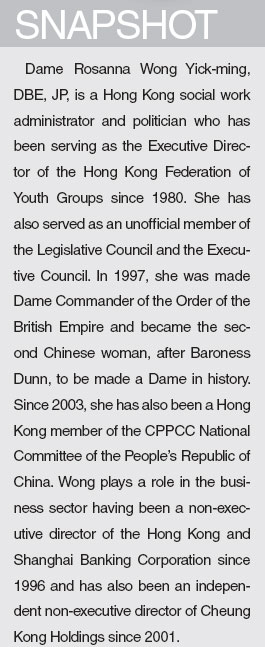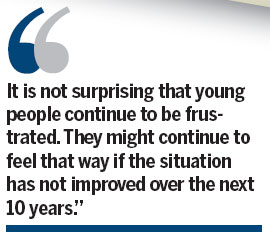Youths housing crisis
Updated: 2014-03-14 06:22
By Wong Joon San(HK Edition)
|
|||||||||
While Hong Kong basks under its aura of affluence, the majority of the city's young people find it increasingly difficult to make their way in a city where living costs are among the highest in the world. The Hong Kong Federation of Youth Groups does what it can to help youths find direction. Wong Joon San reports.
"Housing dilemma" - screams the headline of the cover story on Youth Hong Kong's December 2013 issue. The housing crisis is also the topic that heads the government's list of priorities - set out in Chief Executive Leung Chun-ying's 2013 Policy Address. That the headline appears on the cover of a magazine directed at a youthful readership, underscores the uncertain future faced by the city's young people.
The 52-page Youth Hong Kong quarterly magazine, launched back in 2008, by The Hong Kong Federation of Youth Groups, put together several articles, giving a summation of the real crisis for the city's vaunted "competitive edge". At the heart of the issue: Hong Kong's young people want to untie the apron strings and live independently. Most cannot do so. Many live in their parents' homes into their thirties. Buying a home is out of reach for most young people. Even renting a place to live is too expensive.
Rosanna Wong, executive director of The Hong Kong Federation of Youth Groups, member of the CPPCC National Committee of the People's Republic of China, for Hong Kong, is head of the editorial board of the journal.
As she sat down for an interview with China Daily at the Federation's office in Quarry Bay, Wong's trademark smile quickly faded as the discussion turned to the city's young people and their perceptions. They seem unhappy with just about everything these days, she observes: with the government, with society at large, the education system, the lack of career choices, low salaries and the high cost of living. Many are looking farther afield to build their futures.
"Happiness is subjective!" replies Wong in answer to the follow up question. Even very wealthy people may be unhappy and some people are happy, though they may be very poor. "It really depends on how you see life," she says, leaning back in her chair and sighing deeply.
Wong, has dedicated her life to working with young people. She enjoys working with them. She is the mother of two adult children, aged 28 and 31, both well established in their careers.
In a city confronted with an aging population and a fertility rate well below replacement level, loss of the city's young people would prove the greatest threat of all to the city's future prosperity. What then of "maintaining Hong Kong's competitive edge," the phrase repeated with nearly prayerful fervor among the city's business elites and politicians.
"Hong Kong is unusual in several respects," Wong writes in her forward to the magazine's issue. "High property prices, lack of space, and waiting lists for public housing give a very specific context. By talking to experts and youth, we try to determine the options and the hurdles that need to be addressed, not just immediately, but also while working towards long-term, sustainable solutions."
Youth and happiness
"Young people in Hong Kong are able to get better education than (those of) my generation," she says. "They are more prosperous. Families today have fewer siblings. The youth population today between ages 15 and 24 is 860,000, and the number is declining," she observes.
But young people who have worked hard to earn university degrees because they want to build their futures, naturally, don't want jobs as construction workers or kitchen helpers. There are not many fields of opportunity for many of our educated young people, in a city whose economic base rests in finance and service industries.
The journal's discussion covers a wide range of the problems confronting youth in Hong Kong, "particularly pertinent in Hong Kong, but which we believe have resonance around the world: the dilemma of how young people can get on the first rung, and then try to climb the housing ladder," writes Wong.
The majority of young people have limited choices when it comes to their housing needs. Buying property here is beyond the means of most families making less than HK$60,000 ($7,734) a month. Market conditions have forced up rents, so apartment rentals are exorbitant. That leaves public housing with many thousands on the waiting list. Young people are given low priority on that list and criticized for even applying - for taking away living space from the elderly, even though the young need homes just as desperately. The result is young people, many of whom have graduated from universities, continue the trend of living with their parents, even after starting their careers.
About 30 percent of Hong Kong's population lives in public housing flats. Another 17 percent live in government-subsidized home ownership units. The housing shortage persists however. A collision of factors brought about by the scarcity of land, conflict over how much available land may be used for housing versus what is needed for crucial infrastructure, has created market conditions out of reach of most people - especially young people just starting out.

In his 2013 Policy Address, Chief Executive CY Leung conceded, "It is all too easy for the government to side-step the (housing) problem, but it is today's young people who will have to bear the adverse consequences in future."
Wong agrees, saying: "It is good that the government recognizes this (housing) problem. The more important issue is to address it in a practical way that gives hope to young people, not in the future, but today."
She also agrees with the summation by many professionals that the entire problem has arisen from a "lack of long-term planning in the face of dramatically changing needs. The absence of focused, well thought out policy, she says, contributed significantly to an imbalance of supply and demand, an uneven distribution of housing resources, soaring property prices, insufficient regulation of the property market and land supply shortages."
Professionals contend that government departments are not coordinated, that housing policy and population policy are not linked. "This lack of cohesiveness and perceived government failure is very clearly seen as the major hindrance to any, more accurate appraisals of real housing demand, in the long term."
Housing prices
Hong Kong is a free market, the government is in haste to remind us. The government plays no direct part in determining the cost of housing but can only create policies that help to adjust the market. "But sound policy making demands that the government ensure that it does not create artificial demand or a reduction in supply," Wong says.
"While the government has limited space to build flats, whenever it plans to build, there are opposing voices," she says. For example, if it proposes construction on green belt sites, green groups protest about the effect on the environment and increased pollution. Plans to redevelop old buildings on brownfield sites previously used for commercial purposes, or land that sits unused, have been thwarted. People who live there won't move, protesting long attachment to the neighborhood. If the government seeks to reclaim ocean, conservationists object to the damage to marine habitats.
The housing crisis cannot be solved instantly. "It is not surprising that young people continue to be frustrated. They might continue to feel that way if the situation has not improved over the next 10 years," Wong contends.
Indications from the government are that some percentage of new, subsidized Home Ownership Scheme flats will be designated for occupancy by single applicants, with no restrictions as to the age of the applicants. The feasibility of building public rental housing for single people is also coming under study.
Wong has taken an important role in drawing the attention of the community at large to the issues at stake if the housing issue is not resolved and young people lose hope. Wong was chair of the Housing Authority chairperson when the short-piling scandal erupted in 1998. (In 1997, Hong Kong embarked on a massive public works program. A series of scams related to substandard works, including short piling, soon surfaced from 1998 to 2000, that resulted in ICAC initiating prosecutions in cases of corruption and fraud involving substandard construction works). Wong was blamed by the general public for failing to accept responsibility. In the face of public pressure, she resigned from the Housing Authority four days before the Legislative Council was to vote on her and the then Director of Housing, Tony Miller in June 2000.
So with her direct knowledge of Hong Kong's housing situation, the journal has examined the problem from various angles and laid out the road map for what you may expect, if they have any notion of owning their own homes in Hong Kong.
To sum up, Wong says the ultimate reason for buying a flat, apart from having a roof over your head, is to enjoy it and be happy. Young people should therefore assess affordability carefully before becoming home owners. Otherwise, they can end up with a very heavy financial burden. "Comprehensive planning is needed. But in the long run, your dream can come true, as long as you plot your course carefully," she concludes.
Contact the writer at joonsan@chinadailyhk.com
|
On youth's dream of living independently, Rosanna Wong, executive director of The Hong Kong Federation of Youth Groups, says: "Comprehensive planning is needed. But in the long run, your dream can come true, as long as you plot your course carefully." Parker Zheng / China Daily |



(HK Edition 03/14/2014 page8)
